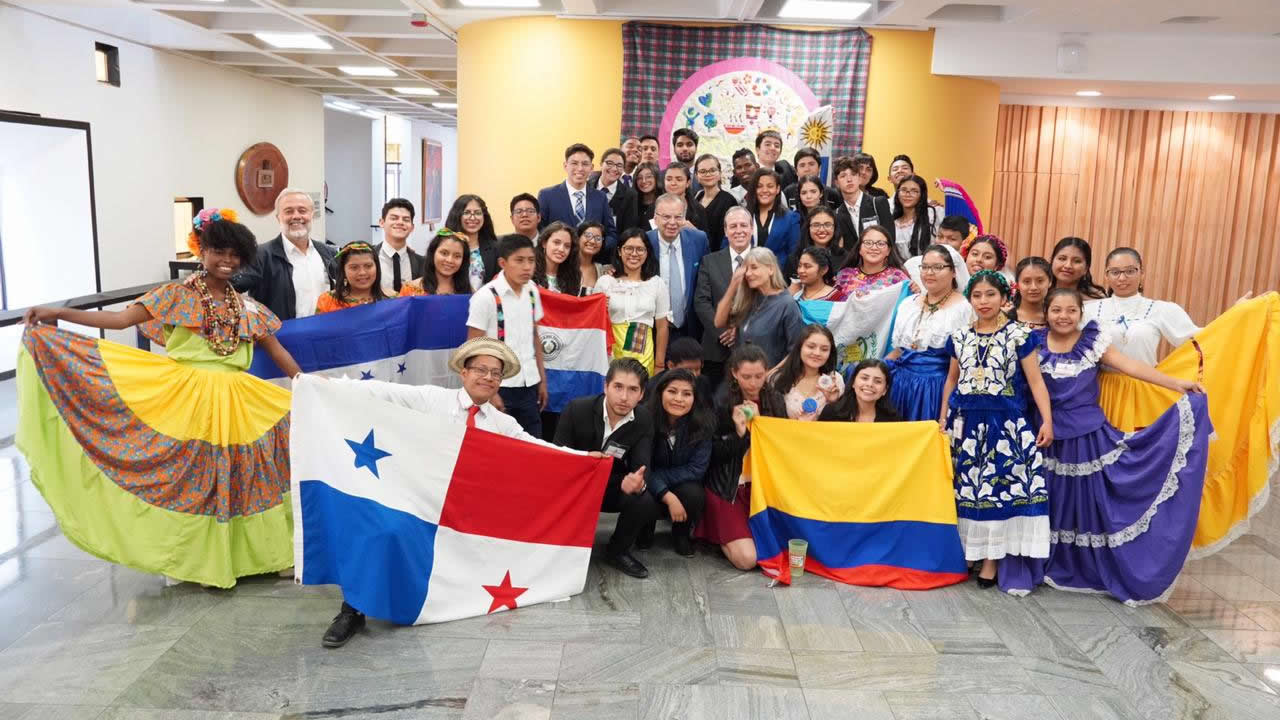Youth from the Region Reaffirm their Commitment to Overcoming Poverty and Inequality, with a View to Achieving the 2030 Agenda
Work area(s)
In the framework of the Concausa 2030 initiative, organized by ECLAC, UNICEF and América Solidaria, some 50 adolescents from 16 Latin American and Caribbean countries unveiled their proposals today in Santiago, Chile.

Young people from 16 countries in Latin America and the Caribbean reaffirmed their commitment to overcoming poverty and inequality, with a view to achieving the 2030 Agenda and its 17 Sustainable Development Goals (SDGs), at a ceremony held today at ECLAC’s headquarters in Santiago, Chile.
The event took place in the framework of the Concausa (“With a Cause”) 2030 initiative – organized by the Economic Commission for Latin America and the Caribbean (ECLAC), the América Solidaria Foundation, and the Office of the United Nations Children’s Fund (UNICEF) in Chile – which seeks to identify and disseminate social and environmental innovation projects led by adolescents in a bid to change the reality of their communities.
The ceremony was inaugurated by Raúl García-Buchaca, ECLAC’s Deputy Executive Secretary for Management and Program Analysis, on behalf of Executive Secretary Alicia Bárcena; Paolo Mefalopulos, UNICEF’s Representative in Chile; and Benito Baranda, Chief Executive of América Solidaria International.
At the inauguration, Raúl García-Buchaca stated that “the region’s young people are the protagonists of the Concausa initiative, and we feel very honored and pleased that they are presenting their projects for a fairer and more egalitarian world here at ECLAC.”
“Sustainable development and the 2030 Agenda cannot be attained without everyone’s participation, and young people like you are key to achieving it,” he added.
Meanwhile, Paolo Mefalopulos emphasized that “young people are showing us that it is possible to change and they are doing it. We adults owe you a great deal. Concausa emerged from the dream shared by ECLAC, UNICEF and América Solidaria, and you are witnesses of history.”
“You will be the main actors in this process. We need all of you to achieve the goals that we vowed to attain, to end poverty and fulfill the 2030 Agenda,” he added.
Benito Baranda, in his remarks, highlighted that the young people participating in the Concausa project today made a choice and moved from indignation to being committed.
“All of you made a choice, not to just be upset or indignant, but to be committed and work on behalf of your territories. If each of you sustains that commitment, we will not only comply with the 2030 Agenda, we will achieve much more. You should hold onto your commitment over time, which has just one goal: social justice,” he stated.
In the fourth version of Concausa, a total of 2,340 people between 14 and 17 years of age applied. Fifty-one (51) young people were selected, coming from Argentina, Bolivia, Chile, Colombia, Costa Rica, the Dominican Republic, Ecuador, El Salvador, Guatemala, Honduras, Mexico, Panama, Paraguay, Peru, the United States and Uruguay.
The youth selected to participate formed 17 teams, each with projects focused on key themes for the region’s development, such as overcoming child poverty, ending gender violence, caring for the environment, and reducing inequalities, among others.
From March 6 to March 11, these teams were participating in a week of educational activities in Santiago, Chile, which allowed them to work on their initiatives along with mentors and experts while also learning about the scope of the 2030 Agenda and its 17 SDGs.
Related link(s)
Country(ies)
- Latin America and the Caribbean
Contact
Public Information Unit
- prensa@cepal.org
- (56 2) 2210 2040